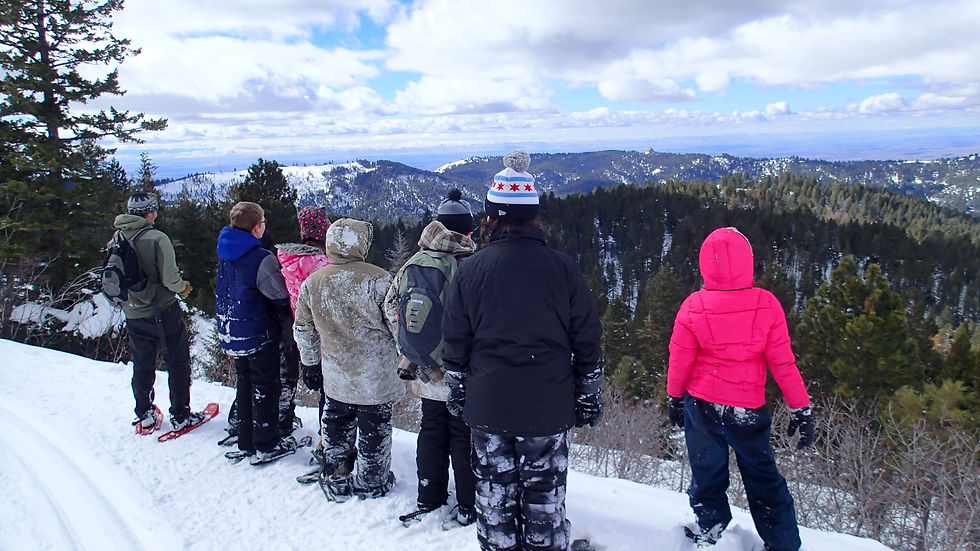Adventure is Out There!
- Misha Smith
- Mar 26, 2023
- 3 min read
Curtis Evans
Curator of Education
The Peregrine Fund’s World Center for Birds of Prey

Photo Credit Tate Mason, Students on a field trip at the World Center for Birds of Prey.
There can be a lot of noise on a field trip, both audibly and statistically. However, one thing rings true after years of hosting field trips for thousands of students from hundreds of schools: Teachers and school administrators have a huge impact on a class/school-wide culture of discovery. While our education program has seen some amazing individual students and extraordinary classes, there are particular schools from which no matter the year, the grade, or the teacher, we know going into the field trip that their students will be engaged and enamored with the natural world. The consistency and reliability of these schools to send students into the “field” ready to learn cannot be a coincidence.
From the perspective of a science field trip provider, there are three ways to prepare students for a memorable and engaging field trip: Practicing group learning skills, basic introduction to the topics, and nurturing an adventurous spirit.
Practice Group Learning Skills
The ability to respect other students and maintain the attention span needed to learn as a group are skills that cannot be understated. Oftentimes, when we host field trips we are helping lay the foundation of how to behave on a field trip, such as how to walk in an orderly fashion to a new location, how to take turns, and ultimately how to engage as a group. Often, a student will make a great observation and ask a topic-related question, but they may not have the attention span to hear an answer. Or, once a question has been answered a different student immediately asks the same question. Rather than building on the idea that the classmates both share, the conversation starts over for the individual. This skill of group learning increases with age, and I also believe it is a result of practice. The painstaking efforts of teachers who lead respectful group discussions in the classroom are noticed and appreciated.
Prepare Students with a Basic Introduction to the Topics
Preparing students with the vocabulary and an introduction to the concepts discussed on the field trip go a long way. Our field trip guides are prepared to lay this foundation and use the grade-specific State Science Standards. Our guides are also prepared to expound upon that foundation and help students apply what they have learned in class to the topic at hand. There just isn’t time in a field trip to do both. Students who have begun their science unit in class take away much more from their field trip. Teachers can also help their tour guides by letting us know which terms and concepts have and have not yet been presented. No matter where the class is in the unit, our goal is to support the work being done in the classroom.
Nurture an Adventurous Spirit
Come with an adventurous spirit, because memorable field trips are fun field trips. Teachers who develop an adventurous spirit in their classroom bring students who are ready to discover. Discovery is a vulnerable prospect because we may learn information on the journey that challenges our worldview and suggests that we may not understand everything around us. Out of all the topics in grade school, Science can be the most intimidating to both students and teachers who don’t know the answers. Educators who have embraced the risky prospect of discovery tend to instill in their students a sense of excitement for the unknown. A teacher who demonstrates this adventurous spirit when confronted with the limits of their own knowledge shows students that it is safe to engage with science and to go on an adventure. Or, as my favorite science educator often says, to “Take chances, make mistakes, and get messy!” While you don’t need to wear science-themed clothing, it doesn’t hurt. More importantly, teachers can demonstrate that it is safe to not know, while using science as a guide in the adventure of discovery.
Thank you to our community of professional educators who have developed this contagious passion for learning in themselves and their students. Educators who are interested in developing their students’ field trip skills should, of course, take their students on field trips, and are invited to connect with science educators and other teachers at events through the Idaho Environmental Educators Association. I am looking forward to seeing you during the upcoming Field Trip Season!






Comments